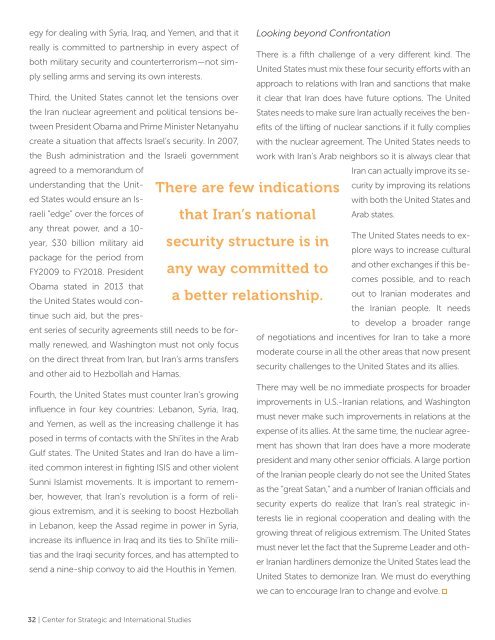Create successful ePaper yourself
Turn your PDF publications into a flip-book with our unique Google optimized e-Paper software.
understanding that the United<br />
States would ensure an Israeli<br />
“edge” over the forces of<br />
any threat power, and a 10-<br />
year, $30 billion military aid<br />
package for the period from<br />
FY2009 to FY2018. President<br />
Obama stated in 2013 that<br />
the United States would continue<br />
such aid, but the present<br />
series of security agreements still needs to be formally<br />
renewed, and Washington must not only focus<br />
on the direct threat from Iran, but Iran’s arms transfers<br />
and other aid to Hezbollah and Hamas.<br />
Fourth, the United States must counter Iran’s growing<br />
influence in four key countries: Lebanon, Syria, Iraq,<br />
and Yemen, as well as the increasing challenge it has<br />
posed in terms of contacts with the Shi’ites in the Arab<br />
Gulf states. The United States and Iran do have a limited<br />
common interest in fighting ISIS and other violent<br />
Sunni Islamist movements. It is important to remember,<br />
however, that Iran’s revolution is a form of religious<br />
extremism, and it is seeking to boost Hezbollah<br />
in Lebanon, keep the Assad regime in power in Syria,<br />
increase its influence in Iraq and its ties to Shi’ite militias<br />
and the Iraqi security forces, and has attempted to<br />
send a nine-ship convoy to aid the Houthis in Yemen.<br />
There are few indications<br />
that Iran’s national<br />
security structure is in<br />
any way committed to<br />
a better relationship.<br />
egy for dealing with Syria, Iraq, and Yemen, and that it Looking beyond Confrontation<br />
really is committed to partnership in every aspect of<br />
There is a fifth challenge of a very different kind. The<br />
both military security and counterterrorism—not simply<br />
selling arms and serving its own interests.<br />
United States must mix these four security efforts with an<br />
approach to relations with Iran and sanctions that make<br />
Third, the United States cannot let the tensions over it clear that Iran does have future options. The United<br />
the Iran nuclear agreement and political tensions between<br />
President Obama and Prime Minister Netanyahu efits of the lifting of nuclear sanctions if it fully complies<br />
States needs to make sure Iran actually receives the ben-<br />
create a situation that affects Israel’s security. In 2007, with the nuclear agreement. The United States needs to<br />
the Bush administration and the Israeli government work with Iran’s Arab neighbors so it is always clear that<br />
agreed to a memorandum of<br />
Iran can actually improve its security<br />
by improving its relations<br />
with both the United States and<br />
Arab states.<br />
The United States needs to explore<br />
ways to increase cultural<br />
and other exchanges if this becomes<br />
possible, and to reach<br />
out to Iranian moderates and<br />
the Iranian people. It needs<br />
to develop a broader range<br />
of negotiations and incentives for Iran to take a more<br />
moderate course in all the other areas that now present<br />
security challenges to the United States and its allies.<br />
There may well be no immediate prospects for broader<br />
improvements in U.S.-Iranian relations, and Washington<br />
must never make such improvements in relations at the<br />
expense of its allies. At the same time, the nuclear agreement<br />
has shown that Iran does have a more moderate<br />
president and many other senior officials. A large portion<br />
of the Iranian people clearly do not see the United States<br />
as the “great Satan,” and a number of Iranian officials and<br />
security experts do realize that Iran’s real strategic interests<br />
lie in regional cooperation and dealing with the<br />
growing threat of religious extremism. The United States<br />
must never let the fact that the Supreme Leader and other<br />
Iranian hardliners demonize the United States lead the<br />
United States to demonize Iran. We must do everything<br />
we can to encourage Iran to change and evolve.<br />
32 | Center for Strategic and International Studies


